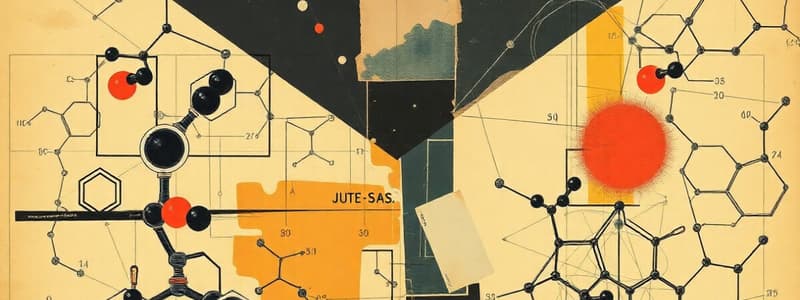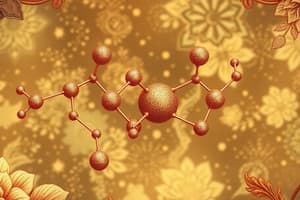Podcast
Questions and Answers
What is the primary function of sulfuric acid (H2SO4) in the presented chemical synthesis?
What is the primary function of sulfuric acid (H2SO4) in the presented chemical synthesis?
- To promote the formation of alkenes
- To hydrolyze butyric acid
- To act as a reducing agent
- To facilitate esterification (correct)
Which compound has a characteristic smell associated with vomit?
Which compound has a characteristic smell associated with vomit?
- Butyric acid (correct)
- Alkane
- Ethyl butyrate
- Ethanol
In the context of organic synthesis, what does the term 'reduction' refer to?
In the context of organic synthesis, what does the term 'reduction' refer to?
- The removal of oxygen from a compound
- The combination of small molecules to form larger molecules
- The addition of functional groups to alkenes
- The conversion of alkenes to alkanes (correct)
What is the typical market concentration of ethyl butyrate as indicated?
What is the typical market concentration of ethyl butyrate as indicated?
Which of the following denotes a hydrocarbon or hydrogen in organic reactions?
Which of the following denotes a hydrocarbon or hydrogen in organic reactions?
What does a molecular formula represent?
What does a molecular formula represent?
Which type of structural drawing indicates how atoms are connected?
Which type of structural drawing indicates how atoms are connected?
What is indicated by a vertex in a structural drawing?
What is indicated by a vertex in a structural drawing?
What should one complete before attending the workshop for CHM1022?
What should one complete before attending the workshop for CHM1022?
Which of the following statements is true regarding conformational isomers?
Which of the following statements is true regarding conformational isomers?
What defines an electrophile in a chemical reaction?
What defines an electrophile in a chemical reaction?
What are the two steps involved in the reaction of alkenes with acids?
What are the two steps involved in the reaction of alkenes with acids?
How do alkene stereoisomers differ from conformational isomers?
How do alkene stereoisomers differ from conformational isomers?
What is the general formula for alkanes?
What is the general formula for alkanes?
How are the bonds between the carbon atoms in alkanes characterized?
How are the bonds between the carbon atoms in alkanes characterized?
What type of geometry do the substituents on a carbon atom in an alkane exhibit?
What type of geometry do the substituents on a carbon atom in an alkane exhibit?
Which functional group is represented by an oxygen atom bonded to one carbon and one hydroxyl group?
Which functional group is represented by an oxygen atom bonded to one carbon and one hydroxyl group?
What type of hybridization is found in alkanes?
What type of hybridization is found in alkanes?
What is true about the structure of organic molecules?
What is true about the structure of organic molecules?
What distinguishes alkenes from alkanes?
What distinguishes alkenes from alkanes?
What structural feature is specific to ethers?
What structural feature is specific to ethers?
Which of the following describes a nucleophilic species?
Which of the following describes a nucleophilic species?
Which atom species is considered an electrophile?
Which atom species is considered an electrophile?
Markovnikov's rule primarily relates to the addition of which type of molecules during reactions?
Markovnikov's rule primarily relates to the addition of which type of molecules during reactions?
What is the result of distinguishing between conformational isomers of alkanes?
What is the result of distinguishing between conformational isomers of alkanes?
What type of bond is classified as a polarized bond?
What type of bond is classified as a polarized bond?
What type of intermediate is formed during the addition of HCl to alkenes?
What type of intermediate is formed during the addition of HCl to alkenes?
According to Markovnikov's rule, which carbon atom is more likely to gain a halide during the addition of HCl?
According to Markovnikov's rule, which carbon atom is more likely to gain a halide during the addition of HCl?
What is the primary characteristic of the carbocation intermediate formed during the reaction?
What is the primary characteristic of the carbocation intermediate formed during the reaction?
When using HCl on alkenes with different hydrogen counts at each end, what is the result?
When using HCl on alkenes with different hydrogen counts at each end, what is the result?
What can be said about the carbocation's energy level during the reaction?
What can be said about the carbocation's energy level during the reaction?
Which statement best describes the stability of carbocations?
Which statement best describes the stability of carbocations?
What is a key feature of the energy profile during HCl addition to alkenes?
What is a key feature of the energy profile during HCl addition to alkenes?
Which of the following best exemplifies Markovnikov's rule in practice?
Which of the following best exemplifies Markovnikov's rule in practice?
Flashcards are hidden until you start studying
Study Notes
Organic Chemistry
- Organic molecules are drawn using different types of structural drawings including Line Bond, Condensed and Skeletal drawings
- In skeletal/condensed line drawings, a vertex represents a carbon atom
- The number of bonds drawn to a vertex determines the number of hydrogen atoms attached to that carbon atom.
Describing Organic Molecules
- The hydrocarbon scaffold of a molecule is a mixture of alkane, alkene, alkyne and arene
- Most organic molecules have multiple functional groups attached
- Organic molecules have a 3-dimensional structure
- A hashed bond represents a bond going into the page, a bold bond represents a bond coming out of the page
Classes of Hydrocarbons
- Alkanes are molecules with two sp3 hybridised carbons making a sigma bond
- Alkanes have the formula CnH2n+2
- Alkanes can be described as saturated
- All bonds to carbon involve sp3 hybridized orbitals, resulting in all substituents being 109 degrees to each other
Alkane Bonding
- A sigma bond is the strong and primary chemical bond within molecules
- Catalytic H2SO4 acts as a catalyst in the formation of esters from carboxylic acids and alcohols
1022 Organic Synthesis Summary
- Organic Synthesis describes the formation of molecules through chemical reactions
- Addition and Reduction are two key reaction types used in Organic Synthesis
- Addition reactions add two groups or atoms to an alkene, generating a new alkane
- Reduction reactions increase the number of hydrogen atoms present in a molecule
- Alkene to alkane reduction reactions occur by removing the double bond
Addition of HCl and Markovnikov’s Rule
- The addition of HX to an alkene will form two products if both ends of the alkene have different numbers of hydrogens
- According to Markovnikov's rule, the carbon with the most hydrogen atoms will gain one more hydrogen
- Markovnikov’s rule is based on the inherent stability of carbocations
Nucleophiles and Electrophiles
- Nucleophiles are chemical species that have a lone pair of electrons or a pi-bond, making them electron-rich
- Electrophiles are chemical species that have a vacant orbital or a polarized bond, making them electron-deficient
Summary
- Conformational isomers of alkanes and alkene stereoisomers are distinct concepts related to molecular arrangements
- Stereochemistry of alkenes is defined by the spatial arrangement of atoms around the double bond
- Markovnikov's rule and carbocation stability help explain the regioselectivity of reactions involving alkenes
Studying That Suits You
Use AI to generate personalized quizzes and flashcards to suit your learning preferences.




